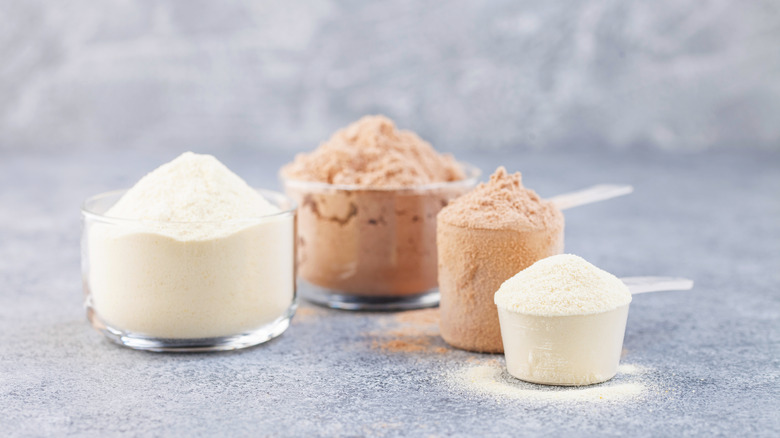Whey Protein Vs. Isolate: What's The Difference?
Wondering what's the difference between whey protein and whey isolate? For starters, you should know that whey protein is an umbrella term for three different products, including whey concentrate, whey isolate, and hydrolyzed whey. The difference between these lies in their nutritional value. Choosing one over another depends on your individual needs.
These dietary supplements are derived from whey, a by-product of cheese production. Manufacturers add lipase and other enzymes to milk to separate the curds and whey, explains the Innovation Center for U.S. Dairy. Next, they pasteurize and dry the whey so it can be used in protein powder and bars, smoothies, and other foods or beverages. Whey is a complete protein, meaning that it supplies all nine essential amino acids, such as leucine, isoleucine, valine, lysine, and others. The human body cannot produce these amino acids, so they must be obtained from food (per the U.S. National Library of Medicine).
Whey protein can be further processed to increase its nutritional value. For example, hydrolyzed whey is obtained through enzymatic hydrolysis, notes Men's Journal. This process breaks down the protein into peptides, making it easier to digest. The end product is higher in protein and lactose than whey concentrate and whey isolate, says food technologist and nutritionist Dawid Lyszczek (via My Protein).
But what's the deal with whey isolate? Is it superior to whey concentrate? Let's find out.
Key differences between whey concentrate and whey isolate
Whey protein is prized for its ability to build lean mass and speed up post-workout recovery. When combined with resistance training, it promotes hypertrophy, or muscle growth, and it may enhance sports performance, per a 2017 review published in the Journal of the International Society of Sports Nutrition. Researchers recommend 1.4 to 2 grams of protein per kilogram of body weight per day to build mass and strength. Higher intakes of up to 3 grams per kilogram may improve body composition, or fat-to-muscle ratio.
But not all protein is created equal. When it comes to whey concentrate versus isolate, it's important to consider nutritional value. Whey concentrate is 25 to 89% protein by dry weight, according to the U.S. Department of Agriculture. Whey isolate, by comparison, boasts at least 90% protein. That's quite a difference! Moreover, this product is lower in carbs, fat, lactose, and cholesterol than whey concentrate, explains sports nutrition advisor Kyle Crowley (via The Protein Works).
Both types of protein are easily digestible and can be used before, during, or after training. However, whey isolate may be a better choice for those with lactose intolerance. As WebMD notes, much of the lactose and carbs in this supplement are removed during processing. The downside is that either product may contain added sugar and fillers. Dietary supplements, including whey protein, don't require FDA approval before going on the market. Therefore, it's your responsibility to check the label and research the ingredients used.

